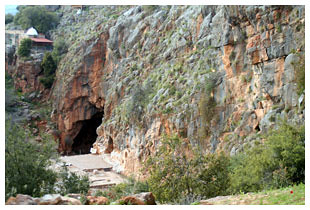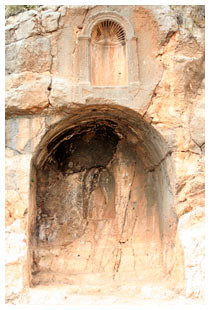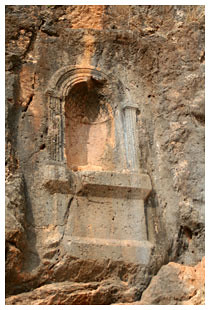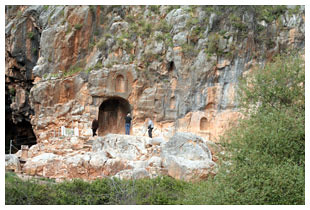The Protestant tradition has taken Jesus declaration here to say that His church was to be built upon the confession recognizing Him as the Messiah and the Son of the living God. This is a valid interpretation, as well, and is a practice supported by other scriptures.
As regards the oft-quoted Mt. 16:18, note the bishops promise in the profession of faith of Vatican 1,
Likewise I accept Sacred Scripture according to that sense which Holy mother Church held and holds, since it is her right to judge of the true sense and interpretation of the holy scriptures; nor will I ever receive and interpret them except according to the unanimous consent of the fathers. — http://mb-soft.com/believe/txs/firstvc.htm
Yet as the Dominican cardinal and Catholic theologian Yves Congar O.P. states,
Unanimous patristic consent as a reliable locus theologicus is classical in Catholic theology; it has often been declared such by the magisterium and its value in scriptural interpretation has been especially stressed. Application of the principle is difficult, at least at a certain level. In regard to individual texts of Scripture total patristic consensus is rare...One example: the interpretation of Peter’s confession in Matthew 16:16-18. Except at Rome, this passage was not applied by the Fathers to the papal primacy; they worked out an exegesis at the level of their own ecclesiological thought, more anthropological and spiritual than juridical. — Yves M.-J. Congar, O.P., p. 71
And Catholic archbishop Peter Richard Kenrick (1806-1896), while yet seeking to support Peter as the rock, stated that,
“If we are bound to follow the majority of the fathers in this thing, then we are bound to hold for certain that by the rock should be understood the faith professed by Peter, not Peter professing the faith.” — Speech of archbishop Kenkick, p. 109; An inside view of the vatican council, edited by Leonard Woolsey Bacon.
Your own CCC allows the interpretation that, “On the rock of this faith confessed by St Peter, Christ build his Church,” (pt. 1, sec. 2, cp. 2, para. 424), for some of the ancients (for what their opinion is worth) provided for this or other interpretations.
• Ambrosiaster [who elsewhere upholds Peter as being the chief apostle to whom the Lord had entrusted the care of the Church, but not superior to Paul as an apostle except in time], Eph. 2:20:
Wherefore the Lord says to Peter: 'Upon this rock I shall build my Church,' that is, upon this confession of the catholic faith I shall establish the faithful in life. — Ambrosiaster, Commentaries on Galatians—Philemon, Eph. 2:20; Gerald L. Bray, p. 42
• Augustine, sermon:
"Christ, you see, built his Church not on a man but on Peter's confession. What is Peter's confession? 'You are the Christ, the Son of the living God.' There's the rock for you, there's the foundation, there's where the Church has been built, which the gates of the underworld cannot conquer. — John Rotelle, O.S.A., Ed., The Works of Saint Augustine , © 1993 New City Press, Sermons, Vol III/6, Sermon 229P.1, p. 327
Upon this rock, said the Lord, I will build my Church. Upon this confession, upon this that you said, 'You are the Christ, the Son of the living God,' I will build my Church, and the gates of hell shall not conquer her (Mt. 16:18). — John Rotelle, Ed., The Works of Saint Augustine (New Rochelle: New City, 1993) Sermons, Volume III/7, Sermon 236A.3, p. 48.
• Augustine, sermon:
For petra (rock) is not derived from Peter, but Peter from petra; just as Christ is not called so from the Christian, but the Christian from Christ. For on this very account the Lord said, 'On this rock will I build my Church,' because Peter had said, 'Thou art the Christ, the Son of the living God.' On this rock, therefore, He said, which thou hast confessed, I will build my Church. For the Rock (Petra) was Christ; and on this foundation was Peter himself built. For other foundation can no man lay than that is laid, which is Christ Jesus. The Church, therefore, which is founded in Christ received from Him the keys of the kingdom of heaven in the person of Peter, that is to say, the power of binding and loosing sins. For what the Church is essentially in Christ, such representatively is Peter in the rock (petra); and in this representation Christ is to be understood as the Rock, Peter as the Church. — Augustine Tractate CXXIV; Philip Schaff, Nicene and Post-Nicene Fathers: First Series, Volume VII Tractate CXXIV (http://www.ccel.org/ccel/schaff/npnf107.iii.cxxv.html)
• Augustine, sermon:
And Peter, one speaking for the rest of them, one for all, said, You are the Christ, the Son of the living God (Mt 16:15-16)...And I tell you: you are Peter; because I am the rock, you are Rocky, Peter-I mean, rock doesn't come from Rocky, but Rocky from rock, just as Christ doesn't come from Christian, but Christian from Christ; and upon this rock I will build my Church (Mt 16:17-18); not upon Peter, or Rocky, which is what you are, but upon the rock which you have confessed. I will build my Church though; I will build you, because in this answer of yours you represent the Church. — John Rotelle, O.S.A. Ed., The Works of Saint Augustine (New Rochelle: New City Press, 1993), Sermons, Volume III/7, Sermon 270.2, p. 289
• Augustine, sermon:
Peter had already said to him, 'You are the Christ, the Son of the living God.' He had already heard, 'Blessed are you, Simon Bar-Jona, because flesh and blood did not reveal it to you, but my Father who is in heaven. And I tell you, that you are Peter, and upon this rock I will build my Church, and the gates of the underworld shall not conquer her' (Mt 16:16-18)...Christ himself was the rock, while Peter, Rocky, was only named from the rock. That's why the rock rose again, to make Peter solid and strong; because Peter would have perished, if the rock hadn't lived. — John Rotelle, Ed., The Works of Saint Augustine (New Rochelle: New City, 1993) Sermons, Volume III/7, Sermon 244.1, p. 95
• Augustine, sermon:
...because on this rock, he said, I will build my Church, and the gates of the underworld shall not overcome it (Mt. 16:18). Now the rock was Christ (1 Cor. 10:4). Was it Paul that was crucified for you? Hold on to these texts, love these texts, repeat them in a fraternal and peaceful manner. — John Rotelle, Ed., The Works of Saint Augustine (New Rochelle: New City Press, 1995), Sermons, Volume III/10, Sermon 358.5, p. 193
• Augustine, Psalm LXI:
Let us call to mind the Gospel: 'Upon this Rock I will build My Church.' Therefore She crieth from the ends of the earth, whom He hath willed to build upon a Rock. But in order that the Church might be builded upon the Rock, who was made the Rock? Hear Paul saying: 'But the Rock was Christ.' On Him therefore builded we have been. — Philip Schaff, Nicene and Post-Nicene Fathers (Grand Rapids: Eerdmans, 1956), Volume VIII, Saint Augustin, Exposition on the Book of Psalms, Psalm LXI.3, p. 249. (http://www.ccel.org/ccel/schaff/npnf108.ii.LXI.html)
• Augustine, in “Retractions,”
In a passage in this book, I said about the Apostle Peter: 'On him as on a rock the Church was built.'...But I know that very frequently at a later time, I so explained what the Lord said: 'Thou art Peter, and upon this rock I will build my Church,' that it be understood as built upon Him whom Peter confessed saying: 'Thou art the Christ, the Son of the living God,' and so Peter, called after this rock, represented the person of the Church which is built upon this rock, and has received 'the keys of the kingdom of heaven.' For, 'Thou art Peter' and not 'Thou art the rock' was said to him. But 'the rock was Christ,' in confessing whom, as also the whole Church confesses, Simon was called Peter. But let the reader decide which of these two opinions is the more probable. — The Fathers of the Church (Washington D.C., Catholic University, 1968), Saint Augustine, The Retractations Chapter 20.1:.
• Basil of Seleucia, Oratio 25:
'You are Christ, Son of the living God.'...Now Christ called this confession a rock, and he named the one who confessed it 'Peter,' perceiving the appellation which was suitable to the author of this confession. For this is the solemn rock of religion, this the basis of salvation, this the wall of faith and the foundation of truth: 'For no other foundation can anyone lay than that which is laid, which is Christ Jesus.' To whom be glory and power forever. — Oratio XXV.4, M.P.G., Vol. 85, Col. 296-297.
• Bede, Matthaei Evangelium Expositio, 3:
You are Peter and on this rock from which you have taken your name, that is, on myself, I will build my Church, upon that perfection of faith which you confessed I will build my Church by whose society of confession should anyone deviate although in himself he seems to do great things he does not belong to the building of my Church...Metaphorically it is said to him on this rock, that is, the Saviour which you confessed, the Church is to be built, who granted participation to the faithful confessor of his name. — 80Homily 23, M.P.L., Vol. 94, Col. 260. Cited by Karlfried Froehlich, Formen, Footnote #204, p. 156 [unable to verify by me].
• Cassiodorus, Psalm 45.5:
'It will not be moved' is said about the Church to which alone that promise has been given: 'You are Peter and upon this rock I shall build my Church and the gates of Hell shall not prevail against it.' For the Church cannot be moved because it is known to have been founded on that most solid rock, namely, Christ the Lord. — Expositions in the Psalms, Volume 1; Volume 51, Psalm 45.5, p. 455
• Chrysostom (John) [who affirmed Peter was a rock, but here not the rock in Mt. 16:18]:
Therefore He added this, 'And I say unto thee, Thou art Peter, and upon this rock I will build my Church; that is, on the faith of his confession. — Chrysostom, Homilies on the Gospel of Saint Matthew, Homily LIIl; Philip Schaff, Nicene and Post-Nicene Fathers (http://www.ccel.org/ccel/schaff/npnf110.iii.LII.html)
• Cyril of Alexandria:
When [Peter] wisely and blamelessly confessed his faith to Jesus saying, 'You are Christ, Son of the living God,' Jesus said to divine Peter: 'You are Peter and upon this rock I will build my Church.' Now by the word 'rock', Jesus indicated, I think, the immoveable faith of the disciple.”. — Cyril Commentary on Isaiah 4.2.
• Origen, Commentary on the Gospel of Matthew (Book XII):
“For a rock is every disciple of Christ of whom those drank who drank of the spiritual rock which followed them, 1 Corinthians 10:4 and upon every such rock is built every word of the church, and the polity in accordance with it; for in each of the perfect, who have the combination of words and deeds and thoughts which fill up the blessedness, is the church built by God.'
“For all bear the surname ‘rock’ who are the imitators of Christ, that is, of the spiritual rock which followed those who are being saved, that they may drink from it the spiritual draught. But these bear the surname of rock just as Christ does. But also as members of Christ deriving their surname from Him they are called Christians, and from the rock, Peters.” — Commentary on the Gospel of Matthew (Book XII), sect. 10,11 ( http://www.newadvent.org/fathers/101612.htm)
• Hilary of Potier, On the Trinity (Book II): Thus our one immovable foundation, our one blissful rock of faith, is the confession from Peter's mouth, Thou art the Son of the living God. On it we can base an answer to every objection with which perverted ingenuity or embittered treachery may assail the truth."-- (Hilary of Potier, On the Trinity (Book II), para 23; Philip Schaff, editor, The Nicene & Post Nicene Fathers Series 2, Vol 9.
 Caesarea Philippi, the modern day reserve of Banias in the Golan Heights region of Israel, was established by Ptolemaic Greeks as a hellenistic city, where the worship of the god Pan was centered. By the early first century, Caesarea Philippi (named in 2 AD by Herod Philip in honor of Caesar Augustus) was reviled by orthodox rabbis, and it was taught that no good Jew would ever visit there.
Caesarea Philippi, the modern day reserve of Banias in the Golan Heights region of Israel, was established by Ptolemaic Greeks as a hellenistic city, where the worship of the god Pan was centered. By the early first century, Caesarea Philippi (named in 2 AD by Herod Philip in honor of Caesar Augustus) was reviled by orthodox rabbis, and it was taught that no good Jew would ever visit there.


